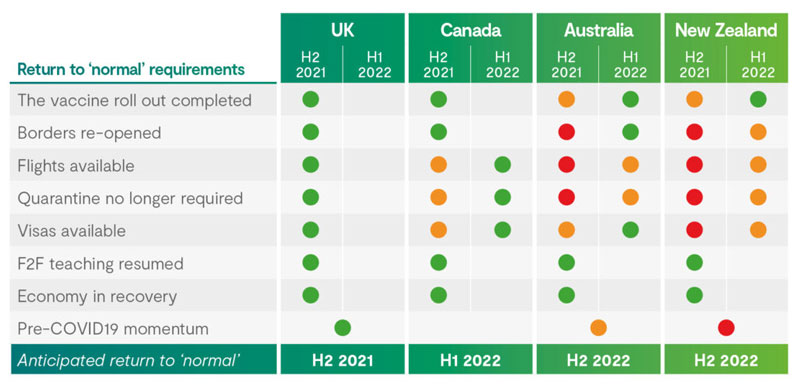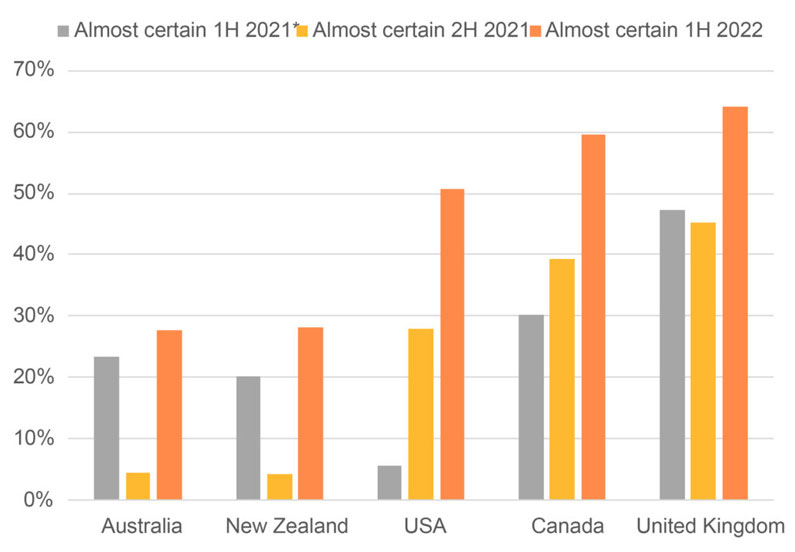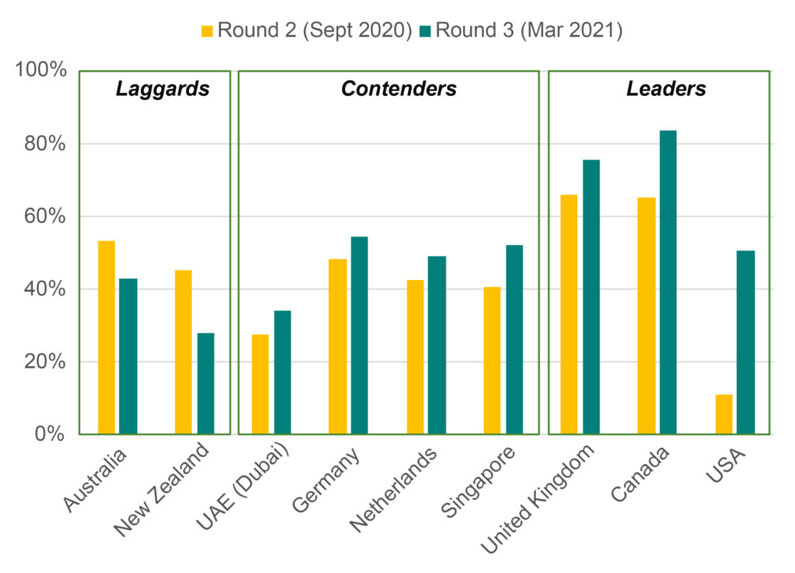Australia & New Zealand – spectators, not beneficiaries, in global student flows

The third (and most recent) round of Navitas Agent Perception Research in March 2021 is the most comprehensive to date, capturing the views and opinions of nearly 900 agents in 73 countries around the world on the impact of COVID-19 on international education.
Australia and New Zealand are characterised by their hard border stance with no end in sight
It is clear that Australia and New Zealand continue to maintain a hard stance against international arrivals. Politicians and the community in both countries remain sensitive to any cases of community transmission of the disease.
In a recent address by the Australian Minister for Education, it was made clear that with the COVID-19 vaccine being rolled out, the Australian government is “increasingly hopeful that student arrivals in larger numbers will occur by Semester 1 of next year.”
In considering proposals for the return of international students, the New Zealand Education Minister has said that, “The reality is it’s just not possible to do that without significantly increasing the risk.” Like his Australian counterpart, his message for the sector is “2022’s looking better than 2021.”
As the following figure shows, a fulsome border re-opening and resumption of international student flows are contingent on a number of key factors.
In the case of Canada, the vaccine rollout has faced various supply-side obstacles but is already starting to pick up pace. As outlined above there are a number of issues that remain around visa processing and quarantine confusion, but there is still a realistic window of opportunity for Canada to get its ducks in a row in time for a possible recovery in the fall of 2021. The demand is certainly there.
Notwithstanding its early mishandling of COVID and its severe second wave, the UK’s rapid vaccine roll-out, recent track record for visa processing, and mostly open borders throughout 2020 makes a 2021 recovery very likely.
Figure 5.1: Assessment of reopening timelines for UK, Canada, Australia and New Zealand

Agents now see little prospect for travel to Australia and New Zealand in 2021, and are reticent about prospects for early 2022
Agents have all but written off the southern hemisphere’s academic year. In response to the question, “Do you expect students to be able to travel to the following destination countries in the second half of 2021?” respondents to the Navitas agent survey are pessimistic. Just 4% consider it almost certain that travel to either Australia or New Zealand will be possible in the second half of 2021.
In contrast, ten times as many agents would consider it almost certain that students would be able to travel to Canada (39%) or the UK (45%). Our research indicates that the start of the northern hemisphere’s academic year in August/September 2020 will be very strong.
As for the first half of 2022, 28% of agents believe travel to either Australia or New Zealand will be ‘almost certain’ – much more prospective than 2021, but much less likely than the UK (64%) or Canada (59%).
Figure 5.2: Do you expect students to be able to travel to the following destination countries in the second half of 2021/first half of 2022?

In the race to recruit international students in 2021, there are leaders, contenders and laggards – with Australia and New Zealand firmly in the latter category
When asked whether there has been more interest in particular countries compared to other countries in the last two months, the responses from almost 900 agents provide a clear delineation between three distinct categories.
First, the UK, Canada and the USA represent the market leaders. Agents were reporting increased interest in these study destinations in September 2020, and have reported even more interest in March 2021, with the USA being notable for the very large jump between recent surveys. Agents are now reporting more interest in the USA than in either Australia or New Zealand.
Second, the market contenders are represented by UAE, Germany, Netherlands and Singapore. These destinations are also now showing increasing interest outpacing Australia and New Zealand.
Third, Australia and New Zealand are the clear laggards. Not only is the level of interest being reported lower than other study destinations, but these are the only two countries that have shown a decline on this indicator since the September survey.
Figure 5.3: “Over the past two months, there has been more interest in this country as an education destination compared to other countries.” Agree/strongly agree

Many industries are looking forward to a strong recovery in 2021, especially as billions of doses of vaccines are deployed to protect the most vulnerable populations around the world. The international education sector could very well form part of the economic recovery. At this stage it looks likely that whatever rebound in global student flows might eventuate in the coming months, Australia and New Zealand will be spectators and not beneficiaries.
Look out for the second part of this report from our most recent agent survey, which considers regional perspectives on study destinations and anticipated recovery in student mobility.
Read the Executive Summary and download the Navitas Agent Perception Report here.